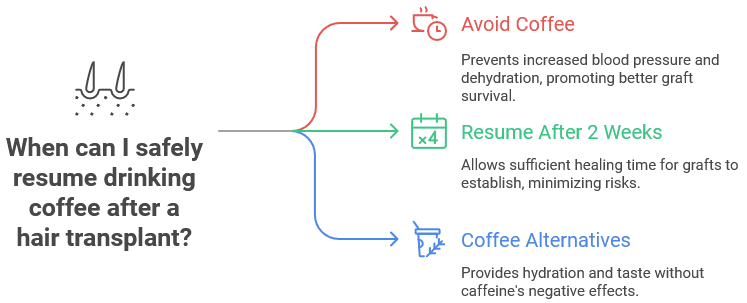Most people around the world drink coffee regularly, at least one or two cups a day, and it can be difficult to give up the habit, even for a short period. While there’s nothing inherently wrong with having a little bit here and there, it can negatively affect the results of a hair transplant surgery.
We’ll go over all the details of what you’ll need to do during recovery and why, so that there is no confusion about this issue.
Can You Drink Coffee After a Hair Transplant?
The general consensus is that you should avoid coffee during the post operative recovery period if you want to get the best hair growth in the upcoming months. That’s because it can reduce graft survival rates and cause patchy growth or a thinner overall look.
Why Caffeine Might Slow Down Your Recovery
The main reason why coffee can interfere with the healing process is that it increases blood pressure. This causes the blood vessels in the scalp to become enlarged and puts extra pressure on the new hair follicles. As these need a few days to fully take root, the side effect of having too much caffeine in your system during this time will be that a lot of your implanted grafts never heal properly and fall out.
It’s also a diuretic, so it will dry out the skin and cause more urine production, leaving the roots of your hair without proper hydration. The last thing you want right after surgery is to put yourself at risk of further hair loss, so you’ll need to avoid coffee for a little while.
When Can You Safely Resume Coffee?
You basically want to wait long enough for the transplant areas to fully heal, which means avoiding coffee for at least a week, preferably two weeks. It takes around 3–5 days for the initial swelling to go down and around 14 days for all the tiny scabs to fall off and the new hair to develop strong roots. After this time, your scalp will have fully healed from the stress of the hair transplant procedure, and you can slowly introduce coffee and other drinks back into your diet.

What Drinks Should You Avoid After Hair Transplant Surgery?
Coffee isn’t the only thing you’ll want to stay away from during your recovery. We’ve provided a handy list of all the beverages that should be off-limits, why you should avoid them, and for how long.
Type of Drink | Adverse Effects | How Long to Avoid |
Alcohol | Thins the blood, increasing the risk of bleeding, and can dehydrate the scalp. | 2 weeks |
Caffeinated (coffee, strong tea, energy drinks, Coca-Cola) | Will increase blood pressure, heart rate, and cause dehydration. | 1–2 weeks |
High in sugar | Causes inflammation, slowing down tissue repair, and increasing risk of infection. | 1–2 weeks |
Carbonated | Can cause bloating and mild dehydration. | Up to 1 week |
High-fat milk beverages | Can trigger excess oil production and inflammation. | 1 week |
Very hot | Increases scalp blood flow, which may lead to more bleeding or irritation. | 3–5 days |
Best Coffee Alternatives for Hair Transplant Patients
If you can’t drink your preferred beverage during this period of time, then what is a good substitute? Well, you can switch to herbal teas like chamomile and mint, as they are caffeine-free, so long as you let them cool down a bit first. There is also decaf if you want the taste of coffee or things like homemade orange juice and lemonade, but without too much added sugar.
The Role of Hydration in Hair Graft Survival
During the recovery process, the newly transplanted hair needs access to plenty of nutrients, so there has to be optimal circulation. If you are dehydrated, the blood becomes thicker, and there is a higher amount of pressure placed on the hair roots.
Also, without proper hydration, the scalp will become tighter and less flexible, which can damage the grafts. That’s why you should avoid drinking alcohol, coffee, or any other drink that dries out the skin right after your surgery.
Post-Transplant Nutrition and Lifestyle Tips from Our Clinic
After you get a hair transplant in Turkey, it’s best to give your body plenty of rest. For the first week, try to avoid exercises and activities that have you bending at the waist or that increase your heart rate significantly.
You should also eat plenty of berries, lean protein, and vegetables, staying away from overly greasy and deep-fried food, and limit dairy products as well. You can get healthy fats from olive oil, fish, and nuts. Lastly, drink plenty of water to keep the body well-hydrated, or go with herbal teas, smoothies, and homemade juices with minimal sugar.
FAQs
Can I drink decaf coffee after a hair transplant?
This option is generally considered safe, as there are only trace amounts of caffeine present. However, you may want to switch to one of the alternative drinks we’ve mentioned just to be on the safe side and completely eliminate any risk.
Why is caffeine bad after a hair transplant?
For one, it dries out the skin, which can damage the still fragile grafts, but it also increases blood pressure, thus placing a lot of stress on the roots that haven’t had time to fully heal.
When is it safe to drink coffee again after FUE or DHI?
In general, after about a week following the operation, the recipient area should be healed enough to minimize the risk, but it’s best to wait for the full two weeks that it takes for complete recovery.
Does coffee affect hair growth?
This drink has no direct effects on the growth rate or thickness of your hair, but it can affect its overall health post surgery and, in that way, limit growth.
The follicles from the donor area need the perfect environment to take root, and anything that slows down the healing process can cause fewer of the grafts to survive. That’s why drinking coffee during the first two weeks can lead to a less dense and voluminous look.

